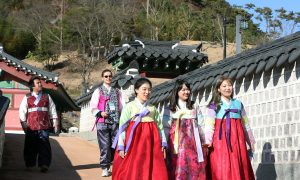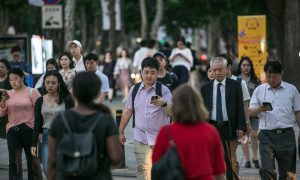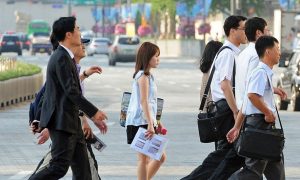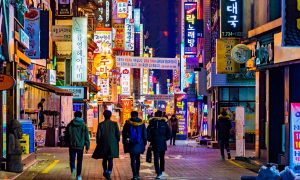As Korea's influence in the global economy, culture, and technology grows, more and more people are looking to Korea, eager to live and thrive in a country of opportunity.2025.Korea Immigration PolicyA new round of adjustments has been ushered in, and this article will provide you with a detailed analysis of the policy changes, the application process and theimmigrantsWe provide comprehensive guidance on what to do after you move to Korea.
I. 2025Korea ImmigrationRecent changes in policy
- Optimization of visa categories
The South Korean government 2025 has refined and optimized the immigrant visa system to attract foreign investment and highly skilled individuals while supporting family reunification. Below are the main visa categories:- D-8 visas (investment visas): Applicable to foreigners who invest or open a business in Korea, with an investment threshold of 100 million won (approximately 75,000 U.S. dollars).
- D-10 visas (job-seeker visas): Facilitates foreigners who wish to find work in Korea and is valid for up to 6 months.
- F-2 Visa (Long-term Residence Visa): Acquired through a specific points system (including language proficiency, education, income, etc.), suitable for those who intend to stay for a long period of time.
- F-6 Visa (Marriage Immigrant Visa): Applicable to foreigners who are married to a Korean citizen and can obtain the right of abode quickly.
- Points-based residency reform
South Korea's F-2 long-term resident visa is managed under a point system.The new policy for 2025 grants more points to applicants with high education, high income, and strong Korean language skills. Applicants with 80 or more points can expedite the review process. - Digital Application and Approval
Korea has launched a new immigration management system where all visa applications can be completed online. Applicants can submit their documents and check their progress through the official website of the Korea Immigration Service (Hi Korea), which has greatly improved efficiency.
II. RapidImmigration to Koreathe main means of achieving the Millennium Development Goals (MDGs)
- pass (a bill or inspection etc)investment immigration
- population (esp. of a group of people): Individuals or entrepreneurs who have the ability to invest in Korea.
- Investment Amount Requirement: The minimum investment amount is 100 million won, and the investment can be in the form of establishing a company, purchasing real estate, or investing in government-designated industries.
- Process & Timing: Submission of a business plan, proof of source of funds and other documents usually takes 3-6 months to complete the approval.
- Immigration through work visas
- population (esp. of a group of people): A foreigner who is employed by a Korean company or engaged in a specific industry.
- Application Steps::
- Secure an employment contract with a Korean company;
- Apply for a work permit (E-7 visas are more common);
- Submit a certificate of no criminal record and certification of academic qualifications.
- dominance: Work visa holders have the opportunity to apply for a long-term resident visa (F-2) after a period of residence.
- Immigration through marriage
- population (esp. of a group of people): Foreigners married to Korean citizens.
- application materials: Proof of marriage registration, proof of identity of the spouse and proof of financial status, etc.
- caveat: Korea is more stringent in scrutinizing the authenticity of marriages, and a number of supporting documents are required to avoid visa fraud.
- Long-term Residence Visa through Points System
- population (esp. of a group of people): Foreigners who plan to reside in Korea for a long period of time.
- Main assessment indicators of the points system::
- Korean Language Proficiency (TOPIK test results)
- Academic qualifications (higher scores for master's degrees and above);
- Annual income (more points for higher income earners).
- special hint: Improving your TOPIK score through Korean language study is a quick way to improve your points.
Three,Immigration to KoreaAdaptation to life after
- Language and cultural adaptation
- Korean language is the foundation for life and work. It is recommended to learn Korean in advance and take the TOPIK exam. The Korean government also offers free language programs for immigrants to helprecent immigrantsRapid integration into society.
- Culturally, Korean society emphasizes etiquette, such as receiving items with both hands and respecting elders.
- Housing and cost of living
- The cost of living in major cities in Korea (e.g. Seoul, Busan) is high, with monthly rents ranging from about 500,000 to 2 million won.
- Daily expenses (food, transportation, etc.) cost approximately 500,000 to 1,000,000 won per month, depending on individual lifestyles.
- Medical and Educational Resources
- Korea has a well-developed healthcare system, and foreigners can also purchase health insurance and enjoy lower medical costs.
- Education resources for children are plentiful, with both international and public schools available, but the higher tuition fees of international schools are more suitable for expatriate children.
IV. Successful case sharing
Case 1: Acquisition of long-term residency through a points-based system
Mr. Li is a Chinese student who found a well-paid job after graduating from his master's degree through a D-10 job-seeking visa. With TOPIK level 5 score and stable income, he successfully applied for F-2 long term resident visa after 1 year of residence.

Case 2: Entrepreneurial Immigration to Korea
Ms. Wang opened a cafe in Seoul through a D-8 investment visa with an investment of 150 million won. After successfully obtaining her residency, her business flourished and she even applied for an F-2 visa to bring her family to Korea for a reunion.

V. Precautions for Immigrants to Korea
- Prepare complete application materials
- The application documents need to be double-certified (notarized certification of the host country and certification by the Korean consulate).
- All materials must be translated into Korean and certified by a professional organization.
- Planning money and time in advance
- The financial requirements for different visa categories vary greatly, so it is necessary to prepare sufficient funds in advance.
- Visa approval times vary depending on individual circumstances and early application is recommended.
- Choosing a Legal Immigration Agent
If you are unfamiliar with the policy, seek help from a professional intermediary, but be sure to verify their qualifications to avoid being scammed.
VI. Summary
In 2025, South Korea opens up more opportunities to the world by optimizing its immigration policies. Whether you choose to immigrate to Korea through work, investment or marriage, you need to understand the relevant policies and processes in advance to ensure the completeness and legitimacy of your application materials. At the same time, cultural adaptation and language learning after moving to Korea are also important aspects of successful integration into Korean society.
I hope this article provides you with clear guidance and helps you to successfullyImmigration to Korea, to realize the wonderful goals of this new phase of life!






